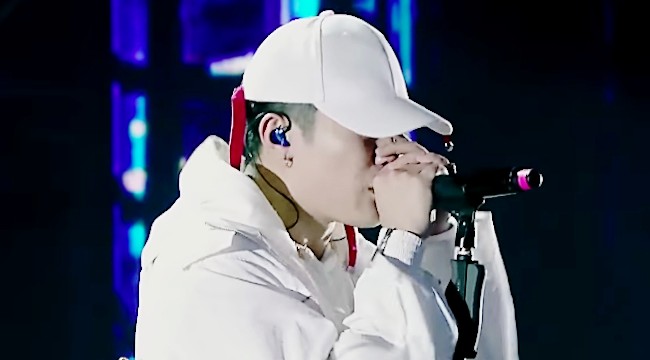
Last month, the Chinese government’s media regulation branch, the State Administration of Press, Publication, Radio, Film, And Television Of The People’s Republic Of China (SAPPRFT), censured hip-hop culture on television, saying that rappers and actors wearing hip-hop style or tattoos were “tasteless, vulgar and obscene.” A series of guidelines were issued that would have effectively banned hip-hop culture from appearing on TV, and several rappers were removed from existing shows and streaming services.
Now, Billboard reports that a number of industry execs and professionals have expressing both understanding and disappointment in the “ban” and its effect on hip-hop culture in China.
Marcus Rowland, head of A&R for the Beijing-based music-services company Outdustry, told Billboard, “This is not the Chinese government trying to ‘fully suppress’ hip-hop. The government exerts massive control over TV and it has decided that hip-hop isn’t acceptable at the highest level of mainstream media.”
Alan Hsia, co-founder of LOOP Inc., a Taiwan-based dance music agency that tours artists in China, says, “This ban is more about allowing hip-hop to be on mainstream platforms. It seems like hip-hop culture influenced mainstream culture [in China] too big and too fast.”
“We have just finished the first six months of ‘post-Rap Of China,’” said Rowland. Rap Of China is a hugely popular TV show spotlighting rappers like PG One and Gai. “PG One has been doing nationwide ad campaigns and Gai was a guest on the huge TV talent show Singer. From the government’s perspective, these rappers were quickly becoming major pop celebrities, and celebrities at that level are supposed to self-censor and be good role models, upholding Chinese/Communist values. This ban is the government saying what most of us always knew: that the government sees hip-hop as part of low-level society and not appropriate for mainstream audiences.”
Meanwhile, Billy Koh, a Beijing-based hit-making pop producer sees the ban as targeted at those specific performers. “This move is individual, [aimed] particularly at those artists who happened to emerge from Rap of China, meaning PG One and Gai, to name a few,” he opined.
Rowland seems optimistic, despite the crackdown, saying that he hopes the ban will actually foster an underground hip-hop culture, much like in the genre’s early days in America, when politicians like Delores Tucker were trying to get the nascent, rabble-rousing musical scene banned from stores due to its sometimes explicit subject matter. “I’m hoping this will force rappers to turn their focus away from chasing fame through major ad campaigns and TV show appearances,” he said, “And focus more on developing a strong, organic fan base on streaming platforms and offline events.”






